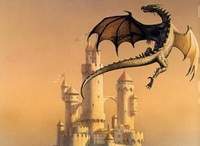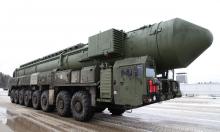Dragons came down to Earth from Sirius to share their wisdom with humans, myths say
Among a great number of fairytale creatures dragons stand out as a particular category. In the memory of many nations they are still wise, amiable, open-hearted and at the same time strange-looking creatures.

West-European medieval ballads describe dragons as winged snatchers of young girls, insatiable and severe treasure keepers who one day still died of swords of knights.
A Swiss religion researcher studied myths, legends and fairytales of people inhabiting Europe, Asia, Africa and America. He thinks that our ancestors actually met and communicated with dragons. This is astonishing that pictures of dragons, descriptions of their looks and conduct left by different nations coincide. Another amazing fact is that first pictures of dragons and legends telling about them appeared within 2,500-4,000 B.C. Often, they appeared as messengers of the skies.
Contemporary ufologist Vadim Arskiy tells about people encountering dragons. Researchers want to closely study the tribe of dogons living in Africa. Thousands-year old myths about dogons mention ‘humans’ who came to Earth from Sirius. It is said that Nommo whose sacred image dogons worship was the one who brought the aliens to Earth. Nommo is described as a combination of a human and a snake with three couples of flexible extremities and a split tongue. It has a smooth shining body covered with green skin. Legends say that Nommo (meaning “the monitors”) as well as other aliens were living side by side with dogons for a long period of time, shared their knowledge and experience with them and then left for their home star.
Dogons keep an image of Nommo’s remains that look like a log of about four meters long decorated with intricate ornamentation. This may sound incredible but images of dragons known in America, China and other parts of the world are of approximately the same size and appearance that the image kept by dogons.
Like contemporary astronomers African villagers knew that dwarf star Sirius B, a small solid star with extremely high mass was revolving around the Sun. How was it possible that dogons could detect the invisible star in the sky? And how could they know that Sirius B consisted of solid and superheavy substance? In addition to these facts, dogons also knew that Sirius B was revolving on its axis and that the Milky Way was a spiral star system. It is perfectly clear that this knowledge could not be the result of mere observation of the sky. Dogons would not obtain this knowledge even if they had a telescope. So, there is every reason to say that the African people got the information about the space immediately from aliens.
China was considered the homeland of dragons at all times. As well as dogons’ legends, Chinese legends also say that dragons came down on this planet from the sky. Old historical scripts say that “the sons of the sky” made up the first calendar and a medicine textbook. One of the aliens, female Juan Di made robots that looked like “the sons of the sky.” Scripts say they had two pairs of eyes and three pairs of extremities.
Majority of “the sons of the sky” left for home immediately after they shared their knowledge with ancestors of Chinese. But some of them died on this planet and were buried here. About 500 B.C., a lost tomb of one of “the sons of the sky” was suddenly discovered when building fortress walls. A dummy was made of the discovered body and later more accurate copies of it were made. One of such statues known as The Dragon Sculpture is still kept at a museum in a provincial Chinese town. Six extremities of “the son of the sky” looked incredibly withered and shapeless. Vadim Arskiy says it occurred because dragons had flexible tubes filled with liquid as bones. It was thanks to this construction of dragon extremities that the creatures were amazingly lissome. When “the son of the sky” died the pressure in the tubes vanished, the bones decreased and became shapeless.
In Peru, people also tell legends about sky messengers. They taught men build irrigation canals and grow corn; women learnt to sew and cook from them. As well as Chinese, Peruvians got a precise calendar from these sky messengers. At that, the looks of messengers who came to Peru wonderfully resembled the looks of dragons seen in China. In 1989, a statue of an Indian woman with a fairytale creature having a pangolin head and a snake body was found in the Sipan Tomb. Judging by the ratio between the height of the woman and the creature, the latter was over four meters high.
In Central America, legends telling about Quetzalcoatl, a feathered dragon, appeared about three thousand years ago. Almost all of the tribes inhabiting Central America honored the dragon and believed it was Quetzalcoatl who gave people an accurate calendar, taught them to mine and work precious stones and observe the stars. Legends also say that after several failures of his mission, ageing Quetzalcoatl left for his father who lived on the Sun.
Who were the wise dragons that descended from the Sun and taught earth dwellers observe the sky, grow plants, work stones, read calendar and other important things? Vadim Arskiy who has been studying UFO and alien visits to Earth for many years already is sure that dragons described in legends and myths were aliens who came to this planet from the center of the Galaxy. The Galaxy consists of stars of four generations. The Sun belongs to the third generation stars. Both the Sun and the Earth could be visited only by spaceships from the stars of the first and the second generations located close to the Galaxy’s center.
The researcher adds that descriptions of dragons prove that their home planet had super weight. Myths about dragons say the creatures had three pairs of extremities and no joints. That is why people who met dragons often compared them to serpents. Nommo and other aliens described in legends were wearing heavy copper sandals, and this is another fact proving their home planet was very heavy.
Anomalia
Subscribe to Pravda.Ru Telegram channel, Facebook, RSS!





